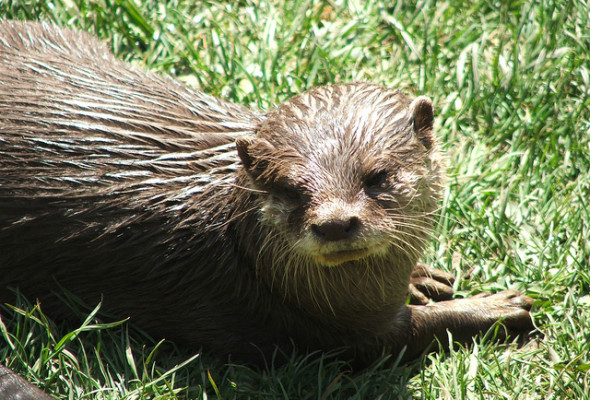Who are the animals that have most inspired people in 2013 to add their voices to the growing movement for animals? Leading up to the end of the year, AWP is celebrating the causes, campaigns and characters that have been at the forefront of helping make history for animals. Each day until the end of the year (apart from Christmas Day) we’ll be focusing on another story. Please share far and wide.
Day 6: Conrad the Otter
On a wet weekend in April 2013 I joined a few hundred other volunteers in the Durham Wildlife Trust’s first annual otter survey. My patch was a stretch of the river in the Derwent Valley, just outside of Newcastle. The exact location of our patches we needed to keep secret, because, almost unbelievably, some people still hunt otters, despite the fact they nearly became extinct in Britain in the middle of the last century.
I didn’t have much luck spotting an otter—they’re smart but wary creatures, who come out to hunt and play at night—but of the 517 sites surveyed, 42% were positive for otter signs, with another 13 proving inconclusive. Compare that to the 1977-1979 national survey, where only 6% of sites surveyed had evidence of otters, and you can see the good signs of recovery for this emblematic mammal.
Durham Wildlife Trust’s Otter Project Officer Vivien Kent said: “Many people will know that between the 1950s and the 1980s otter populations across the country went into severe decline, to the point that the species was in danger of extinction.
“This was caused by the combined effects of pollution and habitat destruction. Since this time, otter populations have been making a natural, but slow, recovery and this survey underlines that point.”
So for the otter 2013 has certainly been a good year, as noted in the RSPB’s State of Nature Report. Otters live in freshwater and wetland habitats—ponds, lakes, rivers, streams—and often eat and mark territory with spraint under bridges. These freshwater habitats occupy just 3% of the UK’s land surface, but support 10% of our species.
As the report states: “Although freshwater habitats receive more protection now than ever before, many are still in a poor condition and the wildlife that lives in them must cope with a barrage of threats, from pollution and water extraction, to invasive non-native species and climate change. As well as being home to a wealth of wildlife, the UK’s freshwater habitats regulate flooding, disperse pollutants, provide water for our domestic, industrial and agricultural activities.”
The Animal Welfare Party believes we need to strengthen the protection of our freshwater habitats to support the wide range of biodiversity found there.
There are some wonderful charities working to help protect the otter population. The award-winning International Otter Survival Fund regularly rescue and rehabilitate otters such as Conrad, a cub, who was found in the middle of the road just this December, and taken to the rescue centre to be looked after.
The Eurasian otter, which is the species found in the UK, is, despite the recovery, still classified as ‘endangered’. Conrad is a true European! The wide range of otters like Conrad across Europe and the threats he and his kind face are at the heart of why the Animal Welfare Party is running for election to the European Parliament in 2014.
On this Christmas Eve can you make 2014 an even safer place for otters like Conrad by becoming a visionary for animals? Support the Animal Welfare Party’s campaign in the EU Elections in May. If you live in London you can PLEDGE TO VOTE, and if you live anywhere and care about animals you can support us in our campaign to raise funds. Fundraising is crucial in our efforts to make history for animals. Make the difference now — and have a wonderful Christmas!
For some beautiful images of the UK’s otters, see this National Geographic otter photo story.
Image of otter © Stewart Morris







Leave a Reply